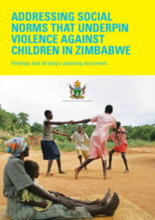This report highlights key findings from a social norms study conducted in Zimbabwe to understand the drivers of violence affecting children. Many drivers of violence against children may not be social in nature and instead are related to structural or interpersonal risk factors. However, many drivers of violence are normative in nature. In order to prevent the root causes of these manifestations of violence, we need to understand the elements of what makes a belief a social norm.
Several theorists have written about what defines a social norm and how best to measure social norms. Many agree there are four key tenants: (1) measuring one’s beliefs about others, (2) their social expectations, (3) who they believe the reference group is – or those people important for the decision or behaviour in question – and, (4) the anticipated reaction of others to following or not following the social norm in the form of possible sanctions.
This document describes the social norms findings from the study across four areas: 1. Child marriage 2. Intersections of violence and adolescent sexual and reproductive health 3. Adolescent relationship violence 4. Violence in educational settings focusing specifically on corporal punishment in schools and violence in ‘bush boarding’ or informal school accommodation arrangements.
Particular attention is paid to the intersections of age, gender and disability and, based on the data, theories of change are proposed. These theories represent a comprehensive description and illustration of how and why a desired change to social norms is expected to happen in a particular context for the issues identified.

